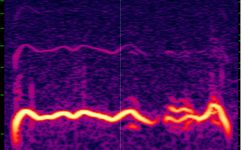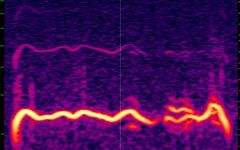Difference between revisions of "Spectrograms of the call of the Common Swift"
Martinwguy (talk | contribs) (→The polyphonic call of the Common Swift) |
Martinwguy (talk | contribs) |
||
| Line 4: | Line 4: | ||
For the last few years, I've looked after fallen Common Swifts | For the last few years, I've looked after fallen Common Swifts | ||
| − | and | + | and, in some of the 45-minute breaks between feeding, recorded some of their cheerful chirping |
| − | with | + | with a high-quality microphone. |
I was thinking to try and learn to recognise a little of their language | I was thinking to try and learn to recognise a little of their language | ||
| − | so as to know when | + | so as to know when someone was thankful, thirsty, |
| − | hungry, afraid, in pain or whatever, to be able to treat them better. | + | hungry, afraid, in pain or whatever, so as to be able to treat them better. |
Instead I found another marvel: they can sing more than one note at a time. | Instead I found another marvel: they can sing more than one note at a time. | ||
| Line 42: | Line 42: | ||
In human terms, it would mean being able to apply vibrato to a note with the speed of mains hum. | In human terms, it would mean being able to apply vibrato to a note with the speed of mains hum. | ||
| − | At a distance, | + | At a distance, a 500Hz raspberry would be inaudible to a swift, especially at a distance, |
but by frequency-modulating the main vocal chord with it, | but by frequency-modulating the main vocal chord with it, | ||
the extra sounds they generate are within their best range of hearing and can also be heard well at a distance. | the extra sounds they generate are within their best range of hearing and can also be heard well at a distance. | ||
Revision as of 12:03, 26 February 2019
The polyphonic call of the Common Swift
For the last few years, I've looked after fallen Common Swifts and, in some of the 45-minute breaks between feeding, recorded some of their cheerful chirping with a high-quality microphone.
I was thinking to try and learn to recognise a little of their language so as to know when someone was thankful, thirsty, hungry, afraid, in pain or whatever, so as to be able to treat them better.
Instead I found another marvel: they can sing more than one note at a time.
Multiple notes or turbo vibrato
Here's the third trill of a ten-second sequence of fourteen trills from Rondone #3 of 2018.
and here it is slowed down by eight times, which drops it by three octaves so that we can hear it better and slows it down that our slow brains can follow it.
The melody moves between 4500 and 5500Hz and the fainter lines higher up the graph and parallel with it are its first and second harmonics (at twice and three times its frequency.)
But what are those extra notes just above and below the main one? They're not harmonics of anything; it's a chord of at least three notes.
The extra notes look equally spaced in frequency, so it may be that the swift is frequency-modulating its call. At the bottom of the first trough about three quarters of the way through, the melody is about 4580Hz, the line above it at 5050Hz and the one above that at 5600Hz, differences of 470Hz and of 550Hz
However, this *still* means it has two voices. Their main voice is about 5000Hz but the frequency modulation is at about 500Hz which, to them, is more like growling than singing. In human terms, it would mean being able to apply vibrato to a note with the speed of mains hum.
At a distance, a 500Hz raspberry would be inaudible to a swift, especially at a distance, but by frequency-modulating the main vocal chord with it, the extra sounds they generate are within their best range of hearing and can also be heard well at a distance.

